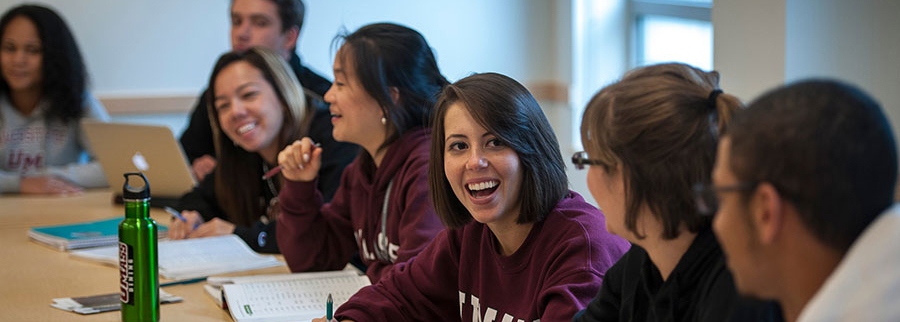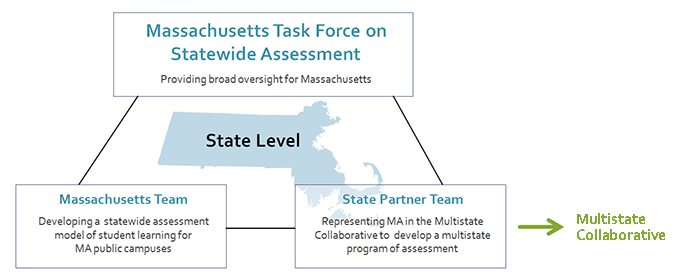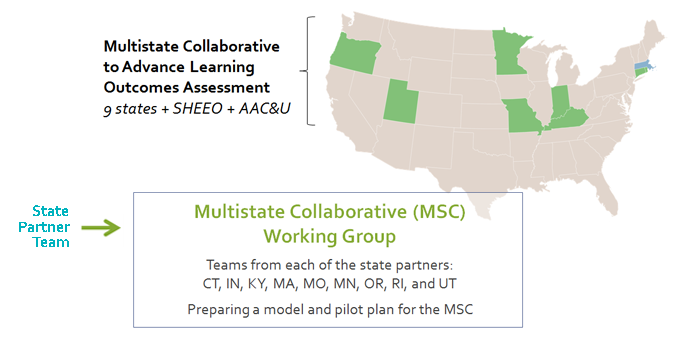
Strategic Initiatives
Research shows that the best way to determine what college students know and can do is to examine their learning outcomes from multiple viewpoints. Massachusetts is part of a national effort to develop student learning assessment tools that capture the complexity of college learning better than a single standardized test, and allows for comparisons between public campuses in the state and similiar institutions in other states. Though the work is challenging, being able to assess and compare student learning will improve teaching and help campuses not only identify problem areas but understand how to solve them.
The Massachusetts Department of Higher Education leads and participates in a number of efforts to advance student learning assessment.

AMCOA advances assessment of student learning on public campuses; strengthens campus assessment capabilities.

The Assessment Advisory Council provides broad oversight for statewide assessment in Massachusetts.
We've also developed statewide, cross-segment student learning outcomes for our foundational courses by discipline to facilitate student transfer from two to four year public institutions.

We participate in the VALUE Institute, a multi-state program of assessment that utilizes authentic student artifacts, which are assessed with AAC&U rubrics.
In June 2011, on the recommendation of the Vision Project Working Group on Student Learning Outcomes and Assessment (![]() Phase II Report ), former Commissioner Richard Freeland directed the Massachusetts Board of Higher Education (BHE) to begin planning to apply for LEAP State status from the Association of American Colleges and Universities (AAC&U). Former Commissioner Freeland assembled an Advisory Group of Presidents who worked with him on the application, including a proposal for a signature initiative to develop an assessment system that met following criteria:
Phase II Report ), former Commissioner Richard Freeland directed the Massachusetts Board of Higher Education (BHE) to begin planning to apply for LEAP State status from the Association of American Colleges and Universities (AAC&U). Former Commissioner Freeland assembled an Advisory Group of Presidents who worked with him on the application, including a proposal for a signature initiative to develop an assessment system that met following criteria:
AAC&U accepted Massachusetts and its proposed LEAP State initiative, which then proceeded on two tracks: the state level and the national level. A ![]() Timeline of Massachusetts' Work on Learning Outcomes Assessment also details the milestones of these early efforts.
Timeline of Massachusetts' Work on Learning Outcomes Assessment also details the milestones of these early efforts.

Work officially began in June 2012 to develop (1) a Massachusetts model for learning outcomes assessment that meets the above criteria and (2) a plan to pilot the model beginning January 2013. This work, bringing together 22 public campuses with the Department of Higher Education, was overseen by the Massachusetts Task Force on Statewide Assessment and executed by the 11-member Massachusetts Team with input from the State Partner Team.
The first pilot of the Massachusetts Model, utilizing authentic student work from seven public campuses in Massachusetts, ran from January to April 2013. After studying the results, the Massachusetts Team prepared a report for the Massachusetts Task Force on Statewide Assessment, recommending continuing with a second pilot. The Task Force made the same recommendation to Former Commissioner Freeland, who agreed to a second pilot that replicated and ran parallel to the first national pilot.

Beginning in March 2012, Massachusetts, SHEEO, and AAC&U discussed with other states the proposal for a Multistate Collaborative to Advance Learning Outcomes Assessment (MSC), and in December 2012 eight other states joined the partnership: Connecticut, Indiana, Kentucky, Minnesota, Missouri, Oregon, Rhode Island, and Utah. Each state appointed members to the MSC as a whole and to an MSC Working Group, which then began the work of developing (1) a multistate model for learning outcomes assessment that meets the above criteria and (2) a plan to pilot the model in 2014.

The Massachusetts Department of Higher Education recently received the second Terrel L. Rhodes Game Changer Award from American Association of Colleges & Universities (AAC&U) at its General Education, Pedagogy & Assessment Conference Opening Plenary on Thursday, April 11, 2024, at the Providence Convention Center. Richard Riccardi, the Deputy Commissioner for Academic Affairs & Student Success received the award representing Commissioner Ortega, In the picture from left to right is Terrel Rhodes; Lynn Pasquerella, President of AAC&U; Lane Glenn, President of Northern Essex Community College and Chair of the statewide Assessment Advisory Council; and Robert Awkward, Assistant Commissioner for Academic Effectiveness who leads institutional assessment for the DHE.
This is a significant accomplishment for the Mass. DHE. We are the second to receive this award from AAC&U after it was given to and renamed after Terrel Rhodes who is the father of VALUE Rubrics. This award recognizes our legacy work to help create the Multi-State Collaborative and to nurture and encourage the use of authentic student artifacts and the VALUE Rubrics as a means for assessing student learning for essential learning outcomes (e.g., written communications, critical thinking, quantitative literacy, etc.). This ultimately involved 13 other states before AAC&U took this over completely from the State Higher Education Executive Officers Association (SHEEO).
Last Update: July 29, 2024
Council of Presidents
April 14, 2017
Download: ![]() Continuing to Advance the Culture of Assessment
Continuing to Advance the Culture of Assessment
Board of Higher Education
March 21, 2017
Download: ![]() Continuing to Advance the Culture of Assessment in Massachusetts
Continuing to Advance the Culture of Assessment in Massachusetts
Community College Council of Presidents
February 22, 2019
Download:
![]() DHE Learning Outcomes Assessment Update
DHE Learning Outcomes Assessment Update
February 17, 2017
Download: ![]() The State of DHE Assessment
The State of DHE Assessment